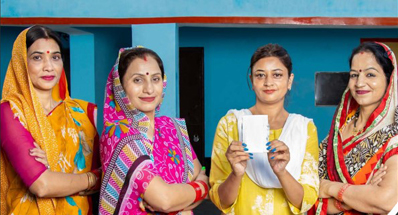This report reveals gaps in education and infrastructure, underscoring the need for collaborative efforts to ensure better menstrual health and hygiene for women and girls in underserved communities.
 |
Menstrual Health & Hygiene Management Programme aims to scale up the interventions on the promotion of safe and sustainable menstrual hygiene management practices among women and adolescent girls. Further, the programme will focus on breaking the silence around social taboos associated with menstruation topics by mobilising men, boys, community leaders, teachers, and health care workers to build supportive environments where menstruators can advocate for their needs. In addition, the project will aim to achieve how to reduce gender inequality in marginalised communities.
Tata Trusts’ Baseline Assessment for this programme, conducted between February and June, 2024, in Assam, Maharashtra, Uttar Pradesh, and Rajasthan, provides important insights into the state of menstrual health across these regions. Commissioned under the Trusts’ WaSH portfolio, the study highlights key strengths and gaps in awareness, infrastructure, and cultural norms that affect menstrual health and hygiene.
The assessment found significant gaps in awareness of Reproductive Tract Infections (RTIs), with only 11.7% of adolescent girls and 16.3% of women aware of these issues. While 94% of respondents demonstrated proper menstrual hygiene practices, such as cleaning reusable products with soap and water, other critical challenges remain. Menstruation disrupts the daily activities of many women and girls, particularly in Assam and Uttar Pradesh, affecting household chores, school attendance, and income-generating activities. Teachers in Rajasthan and Assam reported frequent absenteeism among female students during their menstrual cycles, further emphasising the need for improved support systems in schools.
Cultural stigma continues to pose a barrier to open conversations about menstrual health. Many women and girls feel uncomfortable discussing menstruation outside their families, which limits access to accurate information. Healthcare-seeking behaviour is similarly hindered, with respondents in states like Maharashtra and Uttar Pradesh often relying on traditional advice or waiting for RTIs to resolve on their own.
The study’s recommendations suggest a multi-faceted approach to addressing these challenges. Key interventions include implementing comprehensive educational programmes on menstrual health and RTIs for both adolescents and adults, enhancing school-based menstrual hygiene management, and upgrading sanitary facilities in schools and communities. Community engagement programmes are essential to challenge cultural stigma, while frontline workers and teachers require targeted training and resources to act as effective advocates.
To ensure sustainable progress, the report recommends a robust monitoring and evaluation framework and the development of partnerships between government agencies, NGOs, and international organisations. These efforts aim to create inclusive, stigma-free environments that support menstrual health and hygiene, empowering women and girls to lead healthier and more fulfilling lives.
The Baseline Assessment Report, supported by the Tata Trusts, can be read by clicking here.
